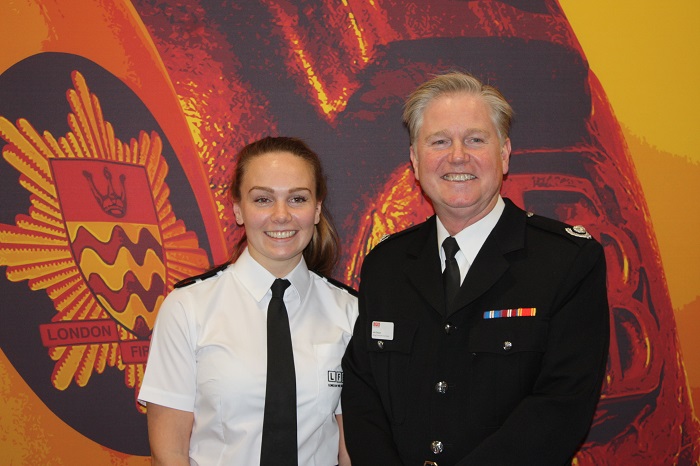Can you believe there’s anyone left on the planet in 2021 who thinks women and girls should not, or cannot, be science leaders?
On International Day of Women and Girls in Science, the Brigade proudly introduces #firesciencefive – some of its own women science leaders sharing how they got interested in science, how they’re making their mark and their tips for women and girls who want to work in science.

According to UNESCO research only around 30 per cent of female students across the world study science, technology, engineering, or mathematics-related topics in higher education, because long-standing bias and gender stereotypes steer women and girls away from these.
Lynsey Seal, joint head of the Brigade’s Fire Engineering team, is a tireless advocate for women and girls to go into science and engineering. Lynsey said: “What's great about science and engineering is that there are so many different fields and roles. There's something for everyone. Those in engineering and science-related roles at the Brigade are vital in our work keeping Londoners safe from fire.”
Lisa Wincott is a Fire Safety Liaison Officer and Cold Scene Examiner with the Brigade’s Fire Investigation team. Lisa attends the scene of fires to record evidence used to determine their cause, as well as analysing data to identify trends around fire causes. Lisa wanted to work in forensics as a girl, taking a special interest in the human body and fire, completing a degree in Forensic Biology and then a master’s degree in Fire Investigation.
Lisa said: “When I was young, I was fascinated by how and why things occur. No two fires are the same; there’s always something new to look at and consider when investigating cause and origin. To anyone wishing to take a path in science, take your first step towards the goal - and then just keep taking steps, no matter where you started from. With hard work and determination you can achieve anything, even when you don’t know that an opportunity will be there at the end.”
Growing up, Collette O’Hara thought her impulse to help meant she’d be a vet or a teacher. Instead, she followed it into fire prevention, working in the Community Safety team before becoming a qualified Fire Engineer. Collette’s work focuses on building regulations to ensure best practice in fire engineering solutions, improving safety standards and the development of fire safety officers.
Collette said: “I love that I can impact the safety of the built environment for the lifespan of a building, which can be 80-100 years. I’m proud of what the Fire Engineering team do, putting Londoners at the heart of everything we strive for. The biggest lesson I’ve taken from my fire engineering degree and my job is that with hard work, determination and commitment, I can achieve anything. To women and girls looking to get into science, I’d say never settle; allow yourself the opportunity to try and then you’ll find, like I did, that you can achieve more than you thought.”

Collette works closely with Fire Engineer Sophie Simpson, whose brief involves reviewing the fire strategies and computer simulations of fire scenarios contained in building regulation consultations, as well as supporting other Brigade disciplines to help them plan their work. Sophie enjoyed science at school but wasn’t sure what she wanted to be.
Studying chemical engineering gave her the option to go into anything from oil and gas through to confectionery. Then Sophie’s father – a retired London firefighter – suggested she consider the Brigade. Sophie said: “The best thing about my job is the range of projects I work on and seeing first-hand how our work makes London's built environment safer,” says Sophie. “I was a competitive swimmer at school. From that I adopted the mentality that as I could train with the boys, I could study with them too, so I wasn’t put off subjects often said to be ‘boy’s subjects’. My advice to women or girls looking to work in science is, don’t let anyone say you won’t succeed. I had a lecturer who said I wouldn’t be able to balance studying and being in competitive sport, but I set my mind to proving him wrong. I’m proud that I did.”
Sophie and Collette are led in their work by Lynsey Seal, who was recently awarded the Queen’s Fire Service Medal. Lynsey dreamed of being an engineer as a girl, modelling this first through her love of Lego and as she got older, spending time with her father, an electrician, before taking work experience in mechanical engineering. Lynsey found maths and science difficult at school but knew she’d have to conquer them to become an engineer – and the work paid off.
As manager of the Brigade’s Petroleum and Alternative Fuels Group, Clare Scawthorn advises other organisations on the safe implementation of new initiatives and ensures her team can support the Brigade’s work around fuel fire safety. She chairs a national group supporting petroleum regulators and industry, drafting new guidance and consulting on existing regulations.
Clare studied law but found her passion for legal application mingled with a fascination for how petrol filling stations worked. This opened up a world of curiosity around engineering innovation and safety. Clare said: “A big part of my job is working with law, so I haven’t strayed far from my original career intentions, but I took the opportunity to follow a different path. My advice to women and girls interested in science is to keep your mind open to all avenues.”
Learn more about science careers at the Brigade and follow us on Twitter for more on our #firesciencefive.